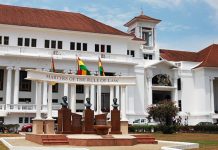The Minister for Lands and Natural Resources, Samuel Jinapor, says his ministry is determined to pursue a robust livelihood scheme for illegal miners in the country.
According to him, when the government launched ‘Operation Halt II’ to rid our water bodies and forest reserve of illegal mining, an estimated one million people were displaced in Ashanti, Eastern, Central, Western and Western North regions, where the exercise was carried out.
These include; Small Scale Miners, hoteliers, metal fabricators, transports operators, food vendors and farmers among others.
He noted that if no alternative livelihood is provided for these people, they will return to the illegal mining and further pollute our eater bodies.
In view of this, he said, Government through his ministry has decided to implement a National Alternative Employment and Livelihood Programme (NAELP), aimed at providing alternative sources of livelihood, for persons who depend on activities of galamsey.
The Programme seeks to ameliorate the unavoidable and unintended hardships, which Government’s efforts to sanitise the Small Scale Mining sector has created and to provide good economic livelihood options to the illegal mining and associated activities, to enable those adversely impacted to work and support themselves and their families.
The Programme, he revealed, is anchored on six main models, namely the Community Mining Scheme, the National Land Reclamation and Revegetation Model, Mine Support Services, Agriculture and Agro-processing, Apprenticeship Skills Training with Entrepreneurship and Community Enhancement Projects.
The land reclamation and revegetation model, in particular, will focus on restoring degraded lands into economically viable lands, creating job opportunities for the youth, landowners and communities at large.
He was speaking at the maiden Public Lecture held by the Students’ Representative Council (SRC) of the Ghana School of Law at the Kwame Nkrumah University of Science and Technology (KNUST), in Kumasi, on the theme: The Legal Regime of the Mining Sector in Ghana : History, Challenges and the Way Forward.”
The Minister, however, argued that Ghana cannot condone the negative impacts of illegal mining on our environment and river bodies and subsequently called on all and sundry to support the crusade against environment destruction in the name of mining.
“We must put in measures that promote small-scale mining while protecting the environment”, he said.
The Minister also revealed plans by his ministry to introduce an initiative program dubbed ‘Responsible Small Scale Mining Awards (RSSMA)’, which is intended to encourage stakeholders in the small-scale mining industry to operate within the laws to promote responsible mining. He said the maiden edition of RSSMA would be held on Wednesday, December 22, 2021.
“The award scheme will from this year be an annual event to reward small-scale miners who adhere to the health, safety and environmental standards of mining.”
Mr Jinapor said he was hopeful that the move would motivate small-scale miners to strictly adhere to the guidelines on small-scale mining spelt out in the Minerals and Mining Act, 2006 (Act 703).The minister repeated the government’s commitment to ensure that all bottlenecks were removed for the country to fully benefit from the mining sector.
He urged stakeholders in the mining sector to work together to ensure proper regulation of the sector.
“We cannot regulate illegal mining if, for example, the inspectorate division of the Minerals Commission cannot monitor the operations of mining or do their work on the principles of integrity and transparency,” he said.
Again, he stressed that, “We cannot regulate this sector if the Minister, Deputy Ministers and officials of the Ministry who have the responsibility to offer supervisory duty do not do so on account of integrity.”
“The Ministry of Lands and Natural Resources and I are determined to continue to work tirelessly to construct a lands and natural resources sector, which is effectively managed, transparent, and anchored on integrity, thereby, contributing to the realisation of the noble vision of President Nana Addo Dankwa Akufo-Addo,” he said.
Mr Jinapor said the allocation of GH 20 million in the 2022 budget to help in the fight against galamsey was an indication that the government was committed to implementing interventions to sanitise the SSM sector
He urged tertiary institutions across country to come up with higher education in mining to produce well-resourced graduates with qualifications and knowledge to help improve the mining industry.
“It is my hope that this lecture, will set the tone for a broader conversion on mineral and mining law and perhaps the introduction of the mining law as a separate and distinct course as the faculties and the introduction of masters programme in mining” he said.
The minister said the mineral resources of the country were the property of the people of Ghana vested in the President as a trustee and, therefore, the government had an obligation to ensure that the exploitation and utilisation of those resources benefited “the actual owners of the resource.”
Samuel Jinapor also noted that an enhanced understanding of the mining sector would greatly advance Ghana’s national development of mineral or mining laws. This will also create a platform for students, lecturers, regulators and all and sundry to constantly critique and review our laws to ensure that they suit the needs of our nation.
“More importantly, the review of our laws must respond to the need of our youth who are the backbone of our economy. According to the 2021 population census, our population is transitioning from the one dominated by children to one dominated by young people between the ages of 15 and 35 who constituted 38.2% of our national population,” he said
According to him, the legal regime of the mining industry had developed from the combination of customary law and British colonial law and that the vesture of natural resources to the president after independence was necessary to protect the resources and to utilise them to the benefits of the nation.










